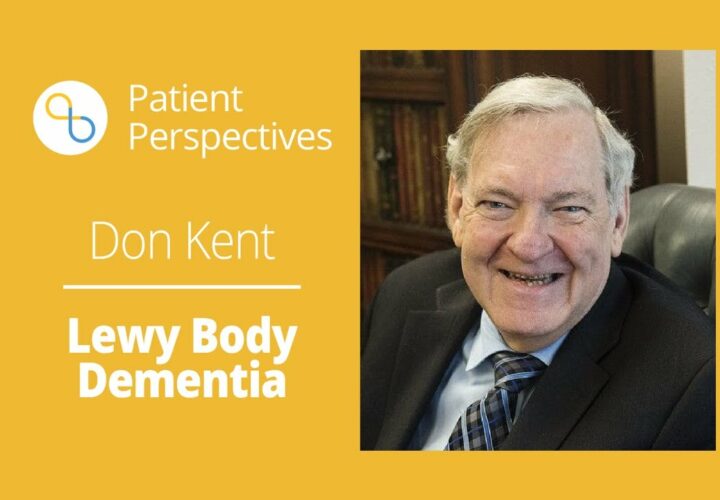An expert and a patient discuss the science behind — and the experience of — dementia-related visual and auditory hallucinations and other symptoms of dementia psychosis.
As part of our BrainTalk series, Being Patient sat down in 2021 with Executive Director of ACADIA Pharmaceuticals Dr. Erin Foff and Chris Schwilk, who lives with Lewy body dementia, about the hallucinations and delusions of dementia.
The hallucinations and delusions of dementia can take a significant toll not only for people with the symptoms, but also their family members. Dementia-related psychosis can lead to repeated hospitalizations, increased likelihood of nursing home placement and faster progression of dementia. While patients face limited options for treatment, researchers are making headway in developing an effective drug to address the symptoms of dementia-related psychosis. Being Patient spoke with Executive Director of ACADIA Pharmaceuticals Dr. Erin Foff and Chris Schwilk, who lives with Lewy body dementia, about managing the hallucinations and delusions of dementia.
There are currently no FDA-approved drugs for the hallucinations and delusions related to dementia.
Subtle symptoms of hallucinations or delusions can be easy to miss. Caregivers and patients should discuss with their doctors about potential signs of hallucinations or delusions.
At the time of the talk, pimavanserin, a drug developed by ACADIA Pharmaceuticals, was under FDA review. If approved, it would have been the first and only treatment for symptoms of dementia-related psychosis. The FDA rejected its application in August 2022.
Being Patient: Chris, when did you begin noticing symptoms of dementia?
Chris Schwilk: I was a university professor [who] trained special education teachers. In my teaching, preparation, grading, I could tell something was off as far back as 2014. I mentioned it to my primary care physician who’s known me for [roughly 20 years] and he said: ‘You’re probably just getting older, but let’s send you for an MRI and make sure you don’t have Alzheimer’s.’ When they sent me for an MRI and I didn’t have Alzheimer’s, I’m like: ‘Cool. Everything’s great, wonderful.’
But over the next couple of years, work just kept getting more difficult. My driving was becoming problematic. Not that I was dangerous, in fact I’m still driving right now with the blessing of my neurologist, but I began not feeling comfortable, or having problems with depth perception …
I had PTSD from an event where I [was] a scuba instructor and unfortunately, one of my students passed away during a swimming test in June of 2016 while I was on sabbatical from my teaching job. I had severe depression, which affected my cognition and I got treatment … After they dealt with the PTSD symptoms, my cognition just wasn’t coming back. I couldn’t make myself grade, I couldn’t make myself plan, and I couldn’t answer questions in class.
Being Patient: Describe to us the hallucinations that you would experience.
Chris Schwilk: When I was driving for quite a while, I would experience big trucks coming into my lane. It scared me to death and I thought that I was done driving at that point. If I’m on the highway, it’s them encroaching on my lane and I would turn very quickly onto the median or another lane.
One night I saw a great big bullfrog jump across my lawn in November [and it was] very cold outside. I’m like: ‘This does not compute. Bullfrogs are not out right now. I don’t live near a pond. There should not be a bullfrog in my backyard.’
My dog had gotten her leash stuck underneath a brick that supported my air conditioner. [She] pulled the brick out, and the brick bounced across the yard. And I thought it was a bullfrog.
I’m getting better at having the perspective of saying: ‘That doesn’t make sense. That’s not what I think it is.’ But sometimes still, I don’t know if what I’m seeing is a hallucination or whether it’s real.
Being Patient: What was the process of getting your diagnosis of Lewy body dementia?
Chris Schwilk: My story is very different than most. I had the advantage of living very close to a major medical center. It was the Hershey Medical Center in Hershey, Pennsylvania, and the neurologist basically advised me at that time to find a different place because they didn’t have a cognitive neurologist, [which is] not the case anymore. I was grateful to her for that honesty.
What took the longest for me was distinguishing between what was depression and anxiety and post traumatic stress syndrome, and Lewy body dementia. I don’t know that it’s possible to necessarily tease that out but we know that there’s a lot of comorbidity between those things. That is, they often exist together. My depression [and] anxiety were debilitating. I ended up in Seattle at a partial hospitalization program.
It was there that the psychiatrist said: ‘I don’t think [your cognitive problems are due to] PTSD. I think it’s depression. I think it’s anxiety, but I think you got a whole lot more going on than that.’ That’s where I got the referral to see a neurologist. I dragged my feet on it for a while. I didn’t want to know. But my story is really atypical. I got a quick diagnosis. The time [from when] I actually saw a neurologist to the time that I got a diagnosis of Lewy body was under three months and that’s unheard of.
Being Patient: Dr. Foff, what’s the difference between a hallucination and a delusion?
Dr. Erin Foff: Hallucinations are when somebody is seeing, hearing, smelling, or otherwise sensing something that isn’t really there. They may taste something [when] there’s nothing in their mouth to tast. [They may] see or hear things. Those are the common ones.
The common definition [for] a delusion is a fixed false belief. It’s when someone is believing something that is not true no matter how much evidence you present to the contrary. This may be something along the lines of someone is stealing from me or my spouse is being unfaithful.
[Delusions and hallucinations] can get a little bit muddled because sometimes, if somebody is really fixed on believing that their hallucination is real, it can be hard to decide if that is a hallucination and a delusion or just a hallucination. The key is that you have to ask. One of the difficult things is that these are tough symptoms to talk about, and they don’t often get discussed in a clinical setting.
Being Patient: How aware are people with dementia of their hallucinations and delusions?
Dr. Erin Foff: Sometimes patients are aware, and sometimes patients are not. Lewy body patients particularly early in their disease like Chris, and Parkinson’s patients, are often very aware, or can be told and can accept that what they’re seeing or experiencing is not real.
In situations particularly with Alzheimer’s disease, where the onset of these features is later, [and] when the dementia itself is more severe, patients are often agnostic, and unaware of their symptoms. Trying to convince them otherwise of the lack of reality of their experience can be in itself distressing. The techniques to approach a patient with these symptoms are very different depending on whether or not a patient is or is not aware.
Being Patient: What do we know about the health effects of the hallucinations and delusions of dementia?
Dr. Erin Foff: We know that patients with hallucinations and delusions, even when they’re not severe, have a faster decline in cognition. They have a faster transition to nursing homes. They actually have higher morbidity and mortality all around. There needs to be a focus of research into whether treating the symptoms when they’re earlier [in the course of the disease] is beneficial to preventing some of those outcomes.
It can be really easy to identify when a hallucination or delusion is outrightly harmful. But sometimes people miss the actual harm of a minor delusion and hallucination. If someone believes that their food is tainted, they may not eat as much, or at all. That might just seem like a missed meal, because the family member doesn’t realize that the reason the person is not eating is they believe something’s wrong with their food.
We should be having these conversations more frequently when we’re meeting with our doctor. Then we can delve deeper into what might be some of the reasons why someone is acting a certain way, and make sure there’s not an indolent symptom there that should be treated.
Being Patient: Tell us about the research and development process of pimavanserin.
Dr. Erin Foff: All of the drugs that exist out there right now in the antipsychotic category were developed for earlier onset psychotic syndromes like schizophrenia. They carry some pretty serious and significant safety liabilities in an elderly population.
ACADIA has developed pimavanserin and it was tailor made initially for Parkinson’s patients, because it hits a chemical pathway in the brain that doesn’t affect motor symptoms. That makes it particularly useful in the Parkinson’s population when [they] already have motor problems, and many of the other antipsychotics have this liability of causing movement problems.
What we noticed when we studied pimavanserin in Parkinson’s patients was that the Parkinson’s patients who also had Parkinson’s-related dementia did very well on the drug in terms of their response of their hallucinations and delusions. That clued us in that maybe the drug would work very well in a broader dementia population and that’s what we’ve been studying.
The interview has been edited for length and clarity.




Thanks for sharing the information was very interesting and helpful.
Great interview. Thank you Mr. Schwilk and Dr. Foff for that informative interview. Patients and their families desperately need better treatment options.